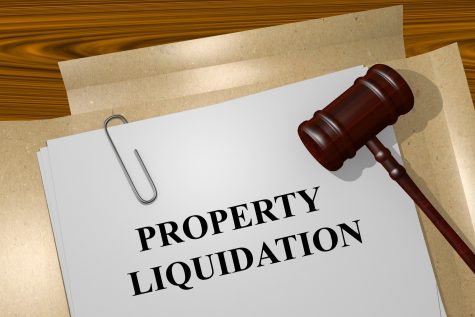The process of estate liquidation presents a labyrinth of complexities that often leaves individuals feeling overwhelmed and ill-equipped to handle such a task. The purpose of this article, ‘How To Liquidate An Estate’, is to demystify the intricacies involved in this process, empowering readers with comprehensive knowledge on how to navigate each step professionally and efficiently. This guide offers invaluable insights for those who find themselves as executors dealing with an inherited estate or individuals planning ahead for what can be an inevitable future.
The article delves into various aspects critical to the estate liquidation process, including understanding the overall procedure, inventorying assets, appraising property values, selling personal items, settling outstanding debts, distributing remaining assets and taking into account legal considerations. The objective is not just to equip readers with a thorough understanding of these elements but also prepare them to manage potential challenges that may arise during the course. By doing so, it enables readers to approach this formidable task with confidence and ensures they are well-informed about the financial implications at stake.
Understanding the Process
Understanding the process of estate liquidation involves comprehending numerous steps, including inventory creation, property appraisal, debt settlement, and finally asset dispersion; these stages require meticulous sell my house fast Fort Worth planning and execution to ensure a smooth transition. It is paramount to be organized and informed about all aspects of this complex procedure. Learning effective estate sale strategies can streamline the entire operation. Despite being overwhelming at first glance, there are many efficient estate liquidation tips that can make the process manageable.
A critical consideration in this process is determining what assets hold value and which do not. This requires a keen understanding of market trends and an ability to accurately appraise various items ranging from household goods to real property. The importance of accurate valuation cannot be understated as it directly influences the overall success of the liquidation endeavor. With careful application of rapid estate liquidation tips such as quick valuation techniques and prompt marketing strategies, one can prevent unnecessary delays in this time-sensitive task.
Through adherence to an efficient estate liquidation guide that emphasizes timely action and strategic decision-making, it becomes plausible to navigate through these intricate procedures with ease. A well-planned approach ensures all debts are settled appropriately before dispersing any remaining assets among beneficiaries or heirs, thus avoiding possible legal complications down the line. Thorough preparation coupled with vigilant execution assures optimal outcomes for all involved parties during a usually stressful phase following loss or significant change in circumstances. Subsequently expanding upon these principles will lead into discussing how exactly one goes about creating an inventory for such assets without using traditional enumeration methods and How To Liquidate An Estate.
Inventory Assets
Initiating the process of asset dissolution necessitates a sell my house fast Texas comprehensive inventory of all tangible and intangible belongings. This initial step is integral to expedited real estate transactions, as it provides an overview of all possessions under consideration. It involves compiling a detailed record of all assets including but not limited to properties, vehicles, jewelry, art pieces, furniture, stocks, bonds and other financial investments. By using this swift property selling guide approach for inventorying all belongings prior to sale helps in ensuring that no valuable item is overlooked or undervalued during the liquidation process.
The second paragraph delves deeper into the importance of careful inventorying in ensuring accelerated property selling. The main objective here is to create a systematic list that accounts for every asset within the estate with its current market value. This can be achieved by hiring professional appraisers or conducting thorough research on various online platforms dedicated to quick home sales. Such meticulous cataloguing aids not only in immediate property sale but also minimizes potential disputes among beneficiaries regarding fair distribution of assets.
Transitioning from exhaustive inventory creation towards understanding and determining asset worth becomes less daunting once a solid groundwork has been laid out through proper cataloguing. The course then steers towards validating these listed assets through appropriate appraising methods which are crucial in assigning correct monetary values based on their existing condition and current market trends. An accurate appraisal will be instrumental in achieving maximum returns when liquidating an estate while maintaining transparency among involved parties.
Appraising the Property
Appraising the property accurately forms a crucial part of the asset dissolution process, as it aids in establishing the current market value of each item, thereby ensuring maximum returns and transparency among all parties involved. It not only dictates a reasonable starting point for negotiations during speedy real estate transactions but also helps to create an atmosphere of trust and fairness. Engaging professional appraisers is advisable since they have extensive knowledge about fast property sale trends and can provide accurate assessments.

- Professional Appraisal:
- A professional appraisal is essential for an expedited real estate deal as it significantly speeds up the property selling process by providing an objective valuation.
- An experienced appraiser knows various strategies for quick home sales, including how to evaluate unique or rare items that might be present within the estate.
- DIY Appraisal:
- While this method can save on costs, it requires substantial knowledge about local real estate prices and other factors affecting property values.
- This approach may be suitable if one has sufficient experience or expertise in real estate matters; otherwise, potential inaccuracies could lead to lower proceeds from the sale.
The completion of an appraisal paves the way towards a more strategic approach in marketing these assets. Notably, with a sound understanding of what each item is worth, one can then proceed to strategically price personal items for sale. This process involves comparing individual valuations with prevailing market rates which will be discussed in detail in the forthcoming section about ‘selling personal items’.
Selling Personal Items
Once the appraisal process is concluded, it becomes essential to strategize the sale of personal items in a way that not only maximizes returns but also ensures a smooth, timely transaction. The goal is to sell the house fast and effectively while getting the most out of each item. To achieve this expedited home selling process, one must be prepared with accurate information about each item’s condition and worth, competitive pricing strategy, and effective marketing plans.
The following table provides tips for selling property rapidly:
| Strategy | Description | Example |
|---|---|---|
| Accurate Pricing | Set prices based on current market trends and the item’s condition. | If an antique vase has a crack, its price should reflect this defect. |
| Professional Photography | High-quality images can significantly increase buyers’ interest. | Hire a professional photographer or invest in good camera equipment. |
| Detailed Descriptions | Provide thorough details about each item including its history if available. | An oil painting by a famous artist would command more interest if potential buyers know its background story. |
| Online Platforms | Leverage online platforms to reach a wider audience. | Use eBay, Craigslist or specialized auction websites for niche items like art or jewelry. |
| Negotiation Skills | Be open to negotiation but have your lowest acceptable price in mind. | If someone offers $80 for an item listed at $100, consider how low you are willing to go before rejecting their offer. |

Understanding these strategies will provide individuals with tools needed during the sell my house quickly phase of liquidation which can often be overwhelming due to numerous personal belongings involved. These strategies not only aid in speeding up sales but also ensure that each article fetches its real value.
Having navigated through valuation and asset disposal stages successfully during estate liquidation allows for focus shift towards managing liabilities associated with same. This involves settling any outstanding debts tied to estate properties – such as mortgages or loans – as well as dealing with any potential inheritance tax issues. Clearing these financial obligations is a crucial part of the estate liquidation process, as it can significantly impact the final inheritance value. This topic, dealing with debt, will be explored in detail in the subsequent section.
Dealing with Debt
Navigating the complex terrain of debt settlement is a critical step in the process of dissolving an inheritance, demanding meticulous attention to detail and a deep understanding of financial obligations associated with inherited properties. The need for rapid house sale or quick cash for homes often arises as part of this process, requiring strategies that ensure fast home closing without compromising on the financial value expected from such transactions. This necessitates an insightful approach to managing debts and selling assets that not only addresses immediate needs but also optimizes long-term gains.
- Understanding Debt Obligations:
- It is essential first to identify all outstanding debts associated with the estate. These may include mortgage payments, personal loans, credit card bills, or any other form of financial obligation.
- Once identified, these debts should be prioritized based on factors like interest rates and penalties for delayed payment.
- Accelerating Home Sales:
- A strategy should be developed to expedite asset liquidation while ensuring maximum return. This could include staging homes for potential buyers or adopting innovative marketing techniques.
- Immediate cash for homes can be a viable option if there exists high urgency in settling debts. However, it’s crucial to consider factors like market conditions and potential loss in property value before opting for such methods.
Addressing debt obligations requires a balanced approach that combines urgency with strategic planning. While accelerating home sales might provide immediate relief from pressing responsibilities, it’s imperative not to overlook long-term implications these choices may have on the overall worth of the estate; hence careful evaluation is encouraged at every stage. As this phase concludes successfully with all debts settled using measures including rapid house sale or getting quick cash for homes through accelerated processes, focus then shifts towards equitable distribution mechanisms underpinning how remaining assets are disseminated amongst beneficiaries – setting stage for the next critical segment in estate liquidation journey.
Distributing Remaining Assets
The process of distributing the remaining assets, following debt settlement, is a critical juncture in the dissolution of an inheritance, requiring both tact and diplomacy to ensure fair allotment among stakeholders. This phase typically involves swift home sale processes or quick cash offers for houses that form part of the estate. Furthermore, these transactions often demand a quick turnaround in real estate sales to prevent further depreciation or unnecessary maintenance costs on unsold properties.
In managing such transactions, one might consider fasttrack real estate options as they offer an expedient resolution while maintaining optimal value for each asset. These accelerated methods are favorable in situations where beneficiaries require prompt settlement due to financial constraints or other personal circumstances. The key here is successful negotiation combined with strategic timing which together can lead to efficient outcomes such as quick cash offers for houses.
Although this stage focuses primarily on liquidating and distributing tangible assets effectively and speedily, it remains important to keep sight of potential legal implications associated with this process. As we delve into this next section about ‘legal considerations’, it becomes increasingly evident how intertwined law and finance are within the realm of estate liquidation. It underscores why understanding both facets is essential when dealing with inherited property.
Legal Considerations
Understanding the legal landscape surrounding inheritance dissolution is critical, as it can significantly impact the financial validity and integrity of transactions involved in asset distribution. When liquidating an estate, several legal considerations are paramount. These include ensuring that there is a clear understanding of existing wills or trusts, complying with probate laws if applicable, settling any outstanding debts owed by the deceased before distributing assets to beneficiaries, and managing potential tax implications. Understanding these aspects can ensure that the process adheres to all relevant regulations while also maintaining fairness among beneficiaries.
Legal Considerations when Liquidating an Estate often encompass various areas such as:
| Probate Laws | Taxes |
|---|---|
| It involves validating a will in court and administering it according to state law | The estate may owe federal or state taxes depending on its size |
| Debts must be settled before asset distribution begins | Tax considerations must be taken into account when distributing certain types of property |

Another area includes handling disputes among heirs which could necessitate litigation. Additionally, certain types of property like stocks might require specific procedures for transfer.
Navigating through these complexities requires knowledge and careful planning which not only ensures regulatory compliance but also protects the financial interests of all concerned parties. Moreover, engaging professional help such as attorneys or accountants experienced in estate liquidation could prove beneficial given their deep understanding of related keywords such as probate laws and estate taxes that are integral components of this blog title keyword – ‘How to liquidate an estate.’ They offer invaluable advice on intricate matters such as determining fair market value for assets during distribution thus preventing potential discord among beneficiaries.
The complexity associated with legal considerations in estate liquidation underscores the importance of thorough preparation and informed decision-making throughout this process. Deft navigation through probate laws, adept management of taxation implications alongside effectively addressing any disputes that arise amongst heirs are pivotal elements that define successful execution. Leveraging professional expertise can greatly assist in navigating these intricacies providing both peace of mind and financial protection to beneficiaries. Thus, understanding these legal considerations enhances the likelihood of a smoother estate liquidation process, safeguarding interests of all parties involved.
Frequently Asked Questions
What emotional challenges can arise when liquidating an estate and how can they be managed?
Emotional challenges during estate liquidation may include grief, stress, and interpersonal conflict. These can be managed through open communication, professional mediation, utilizing therapeutic resources, and maintaining a focus on the deceased’s wishes.
How can I ensure that the liquidation process is fair for all beneficiaries?
Ensuring fairness in estate liquidation for all beneficiaries necessitates a meticulous, transparent approach. This involves impartial asset distribution, considering each beneficiary’s interest, and employing professional services for unbiased assessments and valuations.
What are some common mistakes people make when liquidating an estate and how can they be avoided?
Common errors during estate liquidation include undervaluing assets, failure to account for all assets, and overlooking tax implications. These can be evaded through professional appraisals, thorough inventories, and consultations with tax professionals respectively.
Is it possible to liquidate an estate if the deceased didn’t leave a will?
Yes, estate liquidation is possible even without a will. The process, known as intestate succession, entails following state laws to distribute assets. However, this often involves complex legal procedures and potential disputes among heirs.
How long does it usually take to fully liquidate an estate?
The duration of estate liquidation can vary significantly depending on the complexity of the estate, presence of disputes, and speed of probate court proceedings. Typically, it may range from several months to a few years.
Other Articles You Might Enjoy
How To Pack Jewelry For Moving

